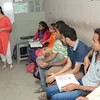Passion during the pandemic: This initiative is bridging the learning gap by upskilling underserved kids
Launched in May 2020, PassionGuru is a free platform that enables underserved children to engage in passion-based learning.
The world has been facing a slew of social problems, right from the outset of the pandemic. While the viral disease has taken countless lives, both at home and abroad, the collateral damage is leaving its mark.
One of the primary issues resulting from lockdown has been the learning gap that has primarily impacted children of migrants and the rural poor who depended on schools for their education.
To bridge this gap in education for destitute children, social entrepreneur Avneesh Chhabra, Founder and Director of Qause by Mindism Tech, created a digital platform – PassionGuru.

Avneesh Chhabra
Launched in May 2020, Gurugram-based PassionGuru is a free platform offering online classes for kids that are served by NGOs, and targets disadvantaged teens across India. It aims to nurture the passions of less-fortunate children by collaborating with experienced mentors in different art forms.
“On our frequent visits to the NGOs, we interacted with children and asked one simple question: ‘What do you want to become?’ We got some expected answers like ‘doctor’, ‘engineer’ or ‘lawyer’, but when we twisted our question a little, they all stood up starry-eyed,” Avneesh shares with SocialStory.
“The question was ‘What do you love to do?’ and we got answers like ‘I love to paint, ‘I love dancing’, they started opening up their artbooks, and we were amazed by the responses. That’s when we realised that passion is what makes these children truly happy,” he added.
Passion-based learning
During the pandemic, children lost their safe space of schools, and many of them were on the verge of being subjected to child labour and underage marriage. However, engaging platforms like PassionGuru is ensuring that these children find a way to keep themselves occupied with productive activities.
Some of these activities include martial arts, freestyle dance, kathak, sketching and painting, rhythm yoga, singing, and sign language.
“Most of the households, even in slum areas, got hold of at least one smartphone and if we can make them use it wisely, then that small screen can do wonders! We recharge their data packs and teach them step-by-step to get into our passion-centric classes,” says Avneesh.

Image: PassionGuru
To extend their reach to the students, they reach out to NGOs and offer to create a web profile for free on their parent platform, Qause – which aggregates NGOs and helps them create a web presence and collaborate through a single platform. Qause has been networking for PassionGuru and providing them with quick entry points into NGOs.
PassionGuru only has a few courses that need the students taking a test including karate, taekwondo and sign language. For these courses, affiliated teachers of the institution provide belts and certifications from recognised government bodies.
“Only a few of our classes have tests, that too only because the concept has that ingrained in it. We believe that passion is something that does not need to be ranked; it's followed primarily for happiness. That being said, we do identify children who are gifted or have potential, and take their passion further in a more personalised manner,” he explains.
Mentorship programme
PassionGuru also allows people to give back to society by becoming a mentor if they have a minimum of three years of experience. This mentorship programme is outlined in four different levels.
Level One consists of introductory classes in groups of 30+ (up to 100) to identify "star" children who are talented, have high potential or are self-motivated.
Level Two conducts advanced classes in closed groups of 10 children who have the same passion.
Level Three comprises the counselling stage, which helps the children identify and understand their life goals beyond their passion, and guides them towards the first steps.
In Level Four, the platform matches them in a one-to-one scenario where they get unlimited free access to a mentor in their field of interest who can help them scale and upskill.
“We have four volunteering options that require very little expertise apart from being fluent in English and their respective regional language at the moment, and considering safety, all our options are online – tele-callers, content writers, moderators, and teachers,” shares Avneesh.
Impact and challenges
A 13-year-old child, Chandni who is based out of a slum in Noida, was attending these classes by borrowing phones from people she knew in the slum who had one. She used to mount it in an alley which has auto-rickshaws parked in it and attended our classes.
“We identified her as a very talented child and just last week, enabled a sponsor to gift her a mobile phone so she can access the plethora of knowledge on the internet along with our classes, whenever she likes,” says Avneesh.

Avneesh Chhabra teaching photography
The programme has impacted over 1,000 children across 29 NGOs in the PassionGuru programme that began in May 2020, post the lockdown. The programme is currently bootstrapped, though it is in the process of raising funds to meet the expenditures of running the classes.
Talking about some the challenges they faced, Avneesh says, “The children and NGOs do not have access to mobiles or tablets and the ones who do, sometimes their internet pack gets exhausted during classes. Many NGOs who attend our classes have 20-30 children attending from one device or screen simply because they cannot afford them. This led to challenges in teaching and tracking these kids or providing them with tailored attention.”
The road ahead
The PassionGuru app is scheduled for launch in the coming days. The app would enable NGOs to see the available classes with schedules, enrol in them, and even join the video class. It will also contain advanced AI and facial recognition software to mark attendance and track the progress of these children through feedback from mentors.
“We plan to expand to other regional states to about 5,000 children in the coming three months and 50,000 kids by next year-end,” shares Avneesh.
Edited by Kanishk Singh








